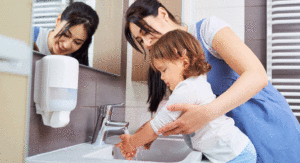 HYANNIS – Just like adults, children are hearing a lot about the coronavirus, which can add some stress and uncertainty to their lives. But there are things parents can do.
HYANNIS – Just like adults, children are hearing a lot about the coronavirus, which can add some stress and uncertainty to their lives. But there are things parents can do.
“It’s important for parents to talk about it and help alleviate children’s fears and downplay any sense of panic,” said Kenneth P. Colmer, MD, who practices at Bass River Pediatrics in South Yarmouth.
Here are some strategies he suggests.
Find out what information your child is getting.
“What they’re hearing may not be factual, so it’s important to know where they’re getting their information,” he said. “Older children are on social media and younger children may be talking about the news with their friends, and they are likely to get a mix of information and misinformation from their peers. Find out what their fears might be and try to reassure them.”
Parents should answer as many questions as they are able to, steer children to reliable sources of information and provide context for the latest news, he said. Be honest in answering questions, but don’t go into more detail than necessary.
Talk in a way that’s age appropriate.
“A 5-year-old and a 17-year-old are going to have different understandings and different concerns,” he said.
“Something that is new or unknown can be scary. Even older teens can feel frightened and vulnerable. The younger your child is, try to not get too scientific about it and explain it in terms that they can understand. Help them understand the illness process of a flu or a virus.
“This is a good chance for parents and children to learn together about what causes illness and what we can do to protect ourselves.”
NPR produced a comic that can be very helpful when discussing the coronavirus with young children.
Remind children to practice good hygiene.
“Handwashing helps to stop germs spreading from person to person,” he said. “Help your child understand that washing their hands helps prevent germs from getting into their body. It’s pretty much the best protection they can get. Schools and health classes and doctors’ offices have been stressing this for years.
Remind kids to sing or hum “Happy Birthday” while they wash their hands. That takes about 20 seconds, long enough to make sure they’ve done a thorough job.
“In my office, most of the kids know to cough or sneeze into their elbow. That’s another great way to stop the spread of germs.”
Getting adequate sleep and eating a healthy diet also will help strengthen your child’s immunity.
Explain why they need to stay home when they feel sick.
If your child has an age-appropriate understanding of how contagion works, they should understand how important it is to keep others safe.
“Some children never want to miss a day of school, but if they’re sick, they need to heal themselves and protect others,” said Dr. Colmer.
Turn to experts when you need to.
“Your pediatrician can help you answer your child’s questions,” he said. “If the child’s anxiety is getting the better of them, talking with a therapist will be helpful.”
Make sure your children know that there are experts at the local, state and global level working on prevention, control treatment.
For more information and CDC resources, visit our coronavirus resources page.























